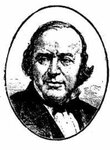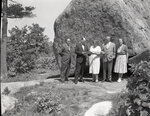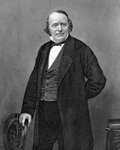





This week, the Trustees of Reservation (The Trustees) officially changed the name of Manchester’s 148-year-old Agassiz Rock reservation after determining the “racist teachings” of the property’s namesake were deemed incompatible with its mission.
The new name of the property is “The Monoliths,” a reference to two Ice Age glacial formations identified there by Agassiz. Fresh signage at the 146-acre property welcomed visitors on Thursday.
The Trustees has owned the cherished local property off School Street since 1957, and it’s the first time the public land trust has changed the name of any of its properties in its 130-year history.
“The mission of The Trustees is to preserve, for public use and enjoyment, properties of exceptional scenic, historic, and ecological value in Massachusetts for all people regardless of race or skin color,” said Managing Director of Community Impact, Janelle Woods-McNish. “While we cannot and will not overlook Agassiz’s scientific contributions, maintaining the Agassiz name on this property would run counter to our goals of inclusion and acceptance for each and every one of our guests who deserve to feel welcome at our special places.”
The move comes after more than a year of research and deliberation into the troubling legacy of Louis Agassiz, a Swiss-born 19th Century naturalist, Harvard professor and proponent of a theory that different human races came from distinct origins within the animal kingdom, with Anglo-Saxons topping the natural order with superior intelligence, morality and physicality, and that this hierarchy was ordained by God.
Even after research that went far and wide, inspiration for the new name came close to home, when a year ago Manchester Historical Museum former president and longtime curator John Huss reached out via The Trustees website and offered to help. His idea? Stay with the actual feature of the property, and away from controversy. He suggested “Manchester Monoliths.”
“What matters is the rocks,” he said, pointing out that Cape Ann is riddled with formations—from Manchester and Essex to Gloucester’s Dogtown and Rockport—all left by glaciers that swept the area. “I’m delighted that I happened to reach out and find a receptive audience.”
The anticipated change has triggered controversy between those pressing The Trustees to drop the name and those who say today’s wave of political correctness and cancel culture has gone too far. Agassiz, they say, lived in a different time. He was a geologist, and a property tied to that work should not be changed.
Indeed, Agassiz’s work in theorizing that the rocks dotting New England’s landscape were shaped and deposited by glaciers and not Noah’s Ark (as believed at the time) was groundbreaking. However, his vehement belief in polygenism—the view that humans of varying skin color are of different origins and non-white races were inferior—could not be overlooked.
“This was absolutely the right decision,” said Eunice “Nicie” Panetta, a Manchester resident and vice chair of The Trustees board of directors who participated in the process. Agassiz, she said, actively espoused racist ideas and shrouded them as science. “He advocated and pushed them using his professional platform to do so.”
Panetta said The Trustees will not “erase” Agassiz from the property. Instead, it will expand on the story of Agassiz as a geologist with signage and online content that includes his later debunked polygenism and its dehumanization of black and brown people.
“Coming to terms with our history is complex and can be contentious, but The Trustees has committed itself to the learning process and embraces this as a journey that doesn’t end but rather evolves,” added Trustees President and CEO John Judge, also a Manchester resident.
Judge, who assumed his current position on January 24 after more than a decade leading the Appalachian Mountain Club, green lit this week’s timing for the name change.
And it is a good time. Interest in the outdoors has spiked during COVID, as Americans look for healthy, safe, beautiful ways to enhance everyday life and mental health. Organizations like The Trustees—historically oriented around preserving natural gems in rural areas like Martha’s Vineyard or Ipswich—have begun to expand their mission and now see green public spaces as a critical action item for places like East Boston and Lawrence. The Monoliths offers a scenic outlook over wooded lands. With much of the property technically in Essex, the vistas span across Manchester and as far as the ocean. On clear days the South Shore of Boston is visible. Seen through the lens of inclusion and diversity, the back story of Agassiz isn’t just about glaciers and the Ice Age. It’s about a scientist with incompatible ideas on race that simply don’t work into the mission of the property’s owner. And that story is as easy to find as clicking buttons on a cell phone for any visitor.
“Agassiz was a non-starter in light of inclusion,” said Hilary Robinson, a law and sociology professor at Northeastern University and vice president of the North Shore NAACP. She is also a resident of Manchester, and one of its few residents of color. “The Trustees is doing something very important. It’s focusing on a welcoming posture for all people. And by not erasing the name of Agassiz, it is starting an important conversation.”
The Trustees are hoping Agassiz’ legacy can start a conversation, about a time long before now when Darwinism and evolution were hotly debated, and America’s abolition of slavery was new.
Born in 1807, over his lifetime, Agassiz rose from obscurity as a man with a deep curiosity for studying and cataloguing animal species to near celebrity status in the US during a time of great public interest in scientific advancement.
His career flourished in America. He was a prolific writer of articles and books, including, Essay on Classification, The Structure of Animal Life, Geological Sketches, and A Journey in Brazil. He married Elizabeth Cabot Cary, his intellectual collaborator and, later, a founder of Harvard’s Radcliffe College. Agassiz was a founder of the Harvard’s Museum of Comparative Zoology and was popular on the paid lecture circuit. Agassiz’s daughter, Ida, married one of Boston’s richest men, Henry Lee Higginson, and had a home on Harbor Street in Manchester. His other daughter, Pauline Agassiz Shaw, lived on the North Shore.
But his work with polygenism was undeniably central and prolific. In 1868, he led an expedition to Brazil. In their resulting collaborative book, A Journey To Brazil, his wife and co-author Elizabeth Agassiz contemplated the success of newly freed slaves in a country where their future was dependent upon non-white Brazilians and Portuguese who lacked the intelligence and energy of Anglo-Saxons.
“The free blacks compare well in intelligence and activity with the Brazilians and Portuguese,” she writes. “But it must be remembered, in making the comparison with reference to our own country, that here (in Brazil) they are brought into contact with a less energetic and powerful race than the Anglo-Saxon.”
For Louis Agassiz, research in Brazil was about meticulous categorization of the animal kingdom. It was also about observing the dangers of “mongrelization” that comes when the races mix. “The natural result of an uninterrupted contact of half-breeds with one another is a class of men in which pure type fades away as completely as do all the good qualities, physical and moral, of the primitive races, engendering a mongrel crowd as repulsive as the mongrel dogs,” he writes.
The Trustees operates 123 sites destinations in Massachusetts, with millions of annual visitors.
In 2021, the group worked with the Stockbridge-Munsee Community Band of Mohican Indians to change insensitive names at other properties, like “Squaw Peak” and “Indian Trail” at Monument Mountain in the Berkshires were changed to Peeskawso Peak (meaning “virtuous woman”) and Mohican Monument Trail. Now, it’s Agassiz Rock’s turn to evolve, becoming “The Monoliths,” with a supporting back story about Louis Agassiz, a man whose flawed theory of creationism overshadowed his geological accomplishments. And that feels right to the folks at The Trustees.
“A young child of 8 or 10 years old should come to this property and see those rocks and get excited about geology,” said Nice Panetta, “and not be burdened by the legacy of racism that is represented by the name.”